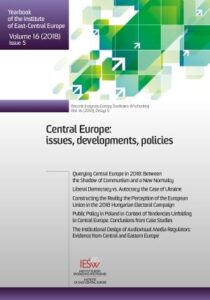ORCID: Krisztina Arató: 0000-0002-3641-7735
Pages: 39-60
Edition: Lublin 2018
DOI: --
Citation method: Krisztina Arató, ‘Constructing the Reality: the Perception of the European Union in the 2018 Hungarian Electoral Campaign’, Yearbook of the Institute of East-Central Europe, Vol. 16, No. 5, 2018, pp. 39-60.
Abstract:
The European Union as a sui generis political system has had its political myths from the beginning of its existence. However, as political myths are not static but are subject to change as groups in the society come up with alternative explanations, countermyths started to emerge already in the 1980s. In our days, we witness competing views – myths and countermyths – on the EU that are presented in politics. In this paper I examine the use of these competing views on the EU in the 2018 Hungarian electoral campaign. I conclude that while FIDESZ and its leader Viktor Orbán applied all countermyths of the EU in his speeches, opposition parties did not talk at all about the European Union, thus leaving the positive myths about the EU unheard during the campaign.
Bibliography:
Arató, K., Myths and Countermyths in the European Union, Studies in Public Policy, Glasgow: University of Strathclyde, 2014.
Arató, K., ‘Pros and Cons in The Brexit Campaign: What do They Tell Us About The European Union?’, ELTE Law Journal, vol. 4, no. 1, 2016, pp. 49-72.
Arató, K. and B. Koller, ‘Magyarország és az Európai Unió’ [Hungary and the European Union], in: A. Körösényi (ed.), A magyar politikai rendszer – negyedszázad után [The Hungarian political system – a decade after], Budapest: Osiris, 2015, pp. 377-400.
Barthes, R., Mythologies, selected and translated from the French by Annette Lavers, New York: The Noonday Press, 1972.
Bell, D., ‘Mythscapes: Memory, Mythology and National Identity’, British Journal of Sociology, vol. 54, no. 1, 2003, pp. 63-81.
Bennett, L. W., ‘Myth, Ritual ans Political Control’, Journal of Communication, vol. 30, no. 4, 1980, pp. 166-179.
Blumenberg, H., Work on Myth. Studies in Contemporary German Social Thought, Massachusetts: MIT, 1988.
Boros, T. et. al., The State of Populism in the European Union, Brussels–Budapest: FEPS, 2016, https://www.policysolutions.hu/userfiles/elemzes/264/state_of_populism_in_europe_in_2016.pdf [2018-05-22].
Botticci, C. and B. Challand, ‘Rethinking Political Myth. The Clash of Civilizations as a Self-Fulfilling Prophecy’, European Journal of Social Theory, vol. 9, no. 3, 2006, pp. 315-336.
Bozóki, A. and D. Hegedűs, ‘An externally constrained hybrid regime: Hungary in the European Union’, Democratization, 2018, DOI: 10.1080/13510347.2018.1455664.
Buti, M. and K. Pichelmann, European integration and populism: addressing Dahrendorf’s quandary, 2017, https://ec.europa.eu/info/sites/info/files/jan2017-populism.pdf [2018-05-22].
Crespy, A., ‘Analysing European Discourses’, in: K. Lyngaard and I. Manners, K. Löfgren (eds), Research methods in European Studies, Basingstoke: Palgrave Macmillan, 2015, pp. 102-122.
Della Sala, V., ‘Political Myth, Mythology and the European Union’, Journal of Common Market Studies, vol. 48, no. 1, 2010, pp. 1-19.
Enyedi, Zs. and K. Benoit, ‘Kritikus választás 2010. A magyar pártrendszer átrendeződése a bal-jobb dimenzióban’ [Critical elections 2010. The realignment of the Hungarian party system in the left-right dimension], in: Zs. Enyedi and A. Szabó Andrea, R. Tardos (eds), Új képlet. Választás Magyarországon 2010 [New pattern. The 2010 election in Hungary], Budapest: DKMKA – Századvég, 2011, pp. 17-42.
European Commisssion, Public opinion, Standard Eurobarometer 88. Autumn 2017. First Results, http://ec.europa.eu/commfrontoffice/publicopinion/index.cfm/Survey/getSurveyDetail/instruments/STANDARD/surveyKy/2143 [2018-05-22].
Fiske, J., Introduction to Communication Studies, London: Routledge, 1982.
Flood, C., Political Myths. A Theoretical Introduction, London and New York: Routledge, 2002.
Greven, T., The Rise of Right-wing Populism in Europe and the United States. A Comparative Perspective, Friedrich Ebert Stiftung, 2016, http://www.fesdc.org/fileadmin/user_upload/publications/RightwingPopulism.pdf [2018-05-22].
Habermas, J., Zur Verfassung Europas. Ein Essay [About the Constitution: an essay], Berlin: Suhrkamp Verlag, 2011.
Hansen, L. and M. C. Williams, ‘The Myths of Europe: Legitimacy, Community and the “Crisi” of the EU’, Journal of Common Market Studies, vol. 37, no. 2, 1999, pp. 233-249.
Hloušek, V. and L. Kopeček, Origin, Ideology and Transformation of Political Parties: East-Central and Western Europe Compared, London: Ashgate, 2010.
Ilonszki, G. and A. Schwarz, ‘Hungarian MPs in the context of political transformation (1990-2010)’, in: E. Semenova and M. Edinger, H. Best (eds), Parliamentary Elites in Central and Eastern Europe: Recruitment and representation, London: Routledge, 2014, pp. 54-73.
Janning, J., ‘Hungary in the EU: From front runner to veto player. Commentary’, European Council on Foreign Relations, 4 April 2018, https://www.ecfr.eu/article/commentary_hungary_in_the_eu_from_front_runner_to_veto_player [2018-05-22].
Messing, V. and G. Bernáth, Infiltration of political meaning-production: security threat or humanitarian crisis? The coverage of the refugee ‘crisis’ in the Austrian and Hungarian media in early autumn 2015, Budapest: CEU SPP Center for Media, Data and Society, 2016, https://cmds.ceu.edu/sites/cmcs.ceu.hu/files/attachment/article/1041/infiltrationofpoliticalmeaningfinalizedweb.pdf [2018-05-22].
Mudde, C. and C. R. Kaltwasser, Populism: A Very Short Introduction, Oxford: Oxford University Press, 2017.
Müller, J.-W., What is populism?, Philadelhia: University of Pennsyvania Press, 2016.
Obradovic, D., ‘Policy Legitimacy and the European Union’, Journal of Common Market Studies, vol. 34, no. 2, June 1996, pp. 191-221.
Polyák, G., ‘Political communication in the Hungarian election campaign’, Univiennamedialab, 4 April 2018, https://univiennamedialab.wordpress.com/2018/04/04/political-communication-in-the-hungarian-electioncampaign/[2018-05-22].
Radaelli, C., ‘Harmful Tax Competition in the EU: Policy Narratives and Advocacy Coalitions’, Journal of Common Market Studies, vol. 37, no. 4, 1999, pp. 661-682.
Reid, J., A Theoretical Explanation of the Construction of Counter Myth: a Case Study of Post Apartheid South African Film, Ph.D. Dissertation, University of South Africa, 2011, http://uir.unisa.ac.za/bitstream/handle/10500/5961/dissertation_reid_j.pdf?sequence=1 [2018-05-22].
Schöpflin, G., ‘The Functions of Myth and a Taxonomy of Myths’, in: G. Hosking and G. Shcöpflin (eds), The Myths of Nationhood, London: Hurst & Company 1997, pp. 19-35.
Sheridan-Rabideau, M. P., ‘The Stuff that Myths Are Made of: Myth Building as Social Action’, Written Communication, vol. 18, October 2001, pp. 440-469.

PDF: Download